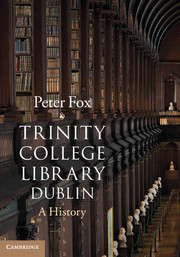Book contents
- Frontmatter
- Dedication
- Contents
- List of illustrations
- List of tables
- Acknowledgements
- Abbreviations
- Introduction
- 1 Early days: 1592–1640
- 2 Ussher, Kells and Durrow: 1641–1665
- 3 Alexander, Bath and the Jacobites: 1666–1708
- 4 A new building: 1709–1737
- 5 Stearne, Gilbert and Lyon: 1738–1749
- 6 The Library in 1750
- 7 Leland to Barrett: 1751–1800
- 8 Fagel: 1798–1809
- 9 Barrett: 1801–1821
- 10 Sadleir, Wall and Todd: 1822–1851
- 11 The Library in 1850
- 12 Todd as Librarian: 1852–1869
- 13 Malet and Ingram: 1869–1886
- 14 Abbott: 1887–1913
- 15 Smyly: 1914–1948
- 16 The Library in 1950
- 17 Parke: 1949–1965
- 18 Professional management: 1965–1983
- 19 Epilogue: 1984–2003
- Appendix 1 Librarians, Assistant Librarians and Deputy Librarians1
- Appendix 2 Growth of the collection
- Appendix 3 The Library oath and declaration
- Sources and select bibliography
- Index of Trinity College Dublin manuscripts
- General index
- Plate Section
Introduction
Published online by Cambridge University Press: 05 June 2014
- Frontmatter
- Dedication
- Contents
- List of illustrations
- List of tables
- Acknowledgements
- Abbreviations
- Introduction
- 1 Early days: 1592–1640
- 2 Ussher, Kells and Durrow: 1641–1665
- 3 Alexander, Bath and the Jacobites: 1666–1708
- 4 A new building: 1709–1737
- 5 Stearne, Gilbert and Lyon: 1738–1749
- 6 The Library in 1750
- 7 Leland to Barrett: 1751–1800
- 8 Fagel: 1798–1809
- 9 Barrett: 1801–1821
- 10 Sadleir, Wall and Todd: 1822–1851
- 11 The Library in 1850
- 12 Todd as Librarian: 1852–1869
- 13 Malet and Ingram: 1869–1886
- 14 Abbott: 1887–1913
- 15 Smyly: 1914–1948
- 16 The Library in 1950
- 17 Parke: 1949–1965
- 18 Professional management: 1965–1983
- 19 Epilogue: 1984–2003
- Appendix 1 Librarians, Assistant Librarians and Deputy Librarians1
- Appendix 2 Growth of the collection
- Appendix 3 The Library oath and declaration
- Sources and select bibliography
- Index of Trinity College Dublin manuscripts
- General index
- Plate Section
Summary
Trinity College Library is the oldest and by far the largest library in Ireland and one of the most important university libraries in Europe. It is unique in the variety of roles it performs. Its special collections, built up over 400 years, combined with its right to claim copies of books and journals published in both Ireland and the United Kingdom, under legal-deposit legislation, have made it a quasi-national library and a research resource of international importance. As home to the Book of Kells, which is housed in the magnificent setting of the Old Library, it is one of the most popular tourist attractions in Ireland and, unusually for an academic library, provides a significant income for its parent institution.
In many ways, the Library is the College's greatest asset. Certainly, when the name of Trinity College is mentioned outside its walls, more often than not it is the Library that springs to mind. The speed with which it was established, in the first few decades after the foundation of the College in 1592, was remarkable, and the early Fellows were clear that its purpose was to support Trinity's principal function of promoting ‘civility, learning and Protestant piety’ among the youth of Ireland. Until the nineteenth century, its role was essentially a custodial one and in this respect it differed little from other university libraries, where ‘collections were acquired, catalogued, gloated over and admired’. Yet much of its history is characterised by periods of relative neglect, interspersed with bursts of activity initiated by individual energetic and efficient Librarians. The Fellows as a whole showed little interest in the running of the Library and its development, which, for much of the seventeenth and eighteenth centuries, owed more to the influence of external forces than to internal planning. Indeed, until the second half of the nineteenth century, the majority of the manuscript treasures and great collections arrived as the result of donations or bequests, with little active intervention on the part of the College: Ussher's library came as a gift from the Irish House of Commons, sanctioned by Charles II; Claudius Gilbert's library was a bequest; and the Fagel collection was bought for the College by the Erasmus Smith Trust.
- Type
- Chapter
- Information
- Trinity College Library DublinA History, pp. 1 - 5Publisher: Cambridge University PressPrint publication year: 2014



